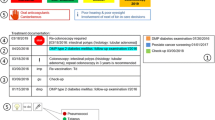Abstract
A computer-based reminder system can help physicians get right information and make right decisions in daily clinical work in time. This study presents a RSS-based Clinical Reminding System (RCRS) designed for reminding clinicians to deal with their varied unfinished clinical works. The RCRS was implemented in a hospital to automatically generate messages for every clinician on the basis of clinical information gathered from the hospital information system (HIS) and send them by RSS feed. In order to allow all physicians to participate in the project, the RCRS was integrated with the Computerized Physician Order Entry (COPE) system to provide messages whenever a clinician logs in the HIS; the connection on screen lets the clinician easily make some response. The system can help clinicians focus on patient care without keeping track of the schedule of clinical chores stored in various systems. Two physicians, also directors from Clinical Informatics Research & Development Center (CIRD) who were appointed as project leaders of the RCRS project who went through the entire development process were chosen as interviewees to obtain a preliminary evaluation of the system. The results show the “Information Content” of this system was suggested to be modified, and “Information Accuracy”, “Formats”, “Ease of use” and “Timeliness” of the system were appropriate to meet the system design purposes.






Similar content being viewed by others
References
Aspden, P., Wolcott, J. A., Bootman, J. L., and Cronenwett, L. R., Committee on Identifying and Preventing Medication Errors. Preventing medication errors: quality chasm series. The National Academies Press, Washington (DC), 2006.
Vashitz, G., Meyer, J., and Pamet, R., Defining and measuring physicians’ responses to clinical reminders. J. Biomed. Inform. 42:317–326, 2009.
McDonald, C. J., Hui, S. L., Smith, D. M., Cohen, S. J., Weinberger, M. and McCabe, G. P., Reminders to physicians from an introspective computer medical record. A two-year randomized trial. Ann. Intern. Med. 100:130–8, 1984.
Savel, R. H., Goldsten, E. B., and Perencenich, E. N., The iCritical care podcast: a novel medium for critical care communication and education. J. Am. Med. Inform. Assoc. 14:94–99, 2007.
Hunt, D. L., Haynes, R. B., Hanna, S. E., and Smith, K., Effects of computer-based clinical decision support systems on physician performance and patient outcomes: a systematic review. JAMA 280(15):1339–1346, 1998.
Garg, A. X., Adhikari, N. K., McDonald, H., Rosas-Arellano, M. P., Devereaux, P. J., Beyene, J., Sam, J., and Haynes, R. B., Effects of computerized clinical decision support systems on practitioner performance and patient outcomes: a systematic review. JAMA 293(10):1223–1238, 2005.
Shojania, K. G., Jennings, A., Mayhew, A., Ramsay, C., Eccles, M., and Grimshaw, J., Effect of point-of-care computer reminders on physician behaviour: a systematic review. CMAJ 182(5):E216–225, 2010.
Tierney, W. M., Overhage, J. M., and Murray, M. D., Effects of computerized guidelines for managing heart disease in primary care. J. Gen. Intern. Med. 18:967–976, 2003.
Kawamoto, K., Houlihan, C. A., Balas, E. A., and Lobach, D. F., Improving clinical practice using clinical decision support systems: a systematic review of trials to identify features critical to success. BMJ 330(7494):765–773, 2005.
Makela, K., Paavola, T., and Stenman, M., Development of short message service application for patient-provider communication in clinical psychiatry. Telemed J E Health. 16(7):827–829, 2010.
Cadenhead, R., Curry, A., and Zellers, S., RSS at Harward Law. RSS Advisory Board, 2005a, last visited 2005-02-18, http://blogs.law.harvard.edu/tech/rss#whatIsRss.
Bray, T., Paoli, J., Sperberg-McQueen, C. M., Maler, E., and Yergeau, F., Extensible Markup Language (XML) 1.0 (Third Edition) W3C Recommendation 04 February 2004, The World Wide Web Consortium, 2004, last visited 2005-02-18, http://www.w3.org/TR/2004/REC-xml-20040204/.
Ola, A., and Niclas, L., RSS—The future of internal communication? Reports from MSI, ISSN 1650–2647, 2005.
Hu, Y. H., Lim, S., and Rizos, C., Delivering GNSS Data Over the Internet Using RSS for Post-processing Applications. International Symposium on GPS/GNSS 2005.
Klein, M., Mika, P., and Serban, R., Semantics-based Publication Management using RSS and FOAF. SemanticDesktop.org. Proceedings of the 1st Workshop on the Semantic Desktop (SD 2005), 4th International Semantic Web Conference, Galway, Ireland.
Çelikbaş, Z., What is RSS and how can it serve libraries? Learning for the Future: e-Learning, pp. 277–292, İstanbul (Turkey), 2004.
Phillippi, J. C., and Buxton, M., Web 2.0: easy tools for busy clinicians. J. Midwifery Women’s Health 55(5):472–476, 2010.
Ku, H. H., and Huang, C. M., Web2OHS: A Web2.0-Based Omnibearing Homecare System. IEEE Trans. Inf. Technol. Biomed. 14(2), 224–233, 2010.
Coile, R. C. Jr., The Paperless Hospital, Healthcare in a Digital Age. Foundation of the American College of the Healthcare Executives, 2002.
Doll, W. J., and TorKzadeh, G., The measure of end-user computing satisfaction. Manage. Inf. Syst. Q. 12(2):259–274, 1988.
DeLone, W. H., and McLean, E. R., The DeLone and McLean model of information systems success: a ten-year update. J. Manage. Inf. Syst. 19(4):9–30, 2003.
Rebitzer, J. B., Rege, M., and Shepard, C., Influence, information overload, and information technology in health care. Adv. Health Econ. Health Serv. Res. 19:43–69, 2008.
Sprague, R. H., Jr., A framework for the development of decision support systems. Manage. Inf. Syst. Q. 4(4):1–26, 1980.
Acknowledgments
This paper is based upon work supported by National Science Council (NSC), Taiwan under grants no. NSC98-Z410-H-126-010-MY2, NSC96-2221-E-126-006, NSC96-2221-E-126-004-MY3 and NSC95-2218-E-007-025. Any opinions, findings, and conclusions or recommendations expressed in this material are those of the authors and do not necessarily reflect the views of the NSC.
Author information
Authors and Affiliations
Corresponding author
Rights and permissions
About this article
Cite this article
Chi, WC., Wen, CH., Lin, CY. et al. Use of RSS Feeds for the Implementation of Clinical Reminder. J Med Syst 36, 2029–2036 (2012). https://doi.org/10.1007/s10916-011-9665-6
Received:
Accepted:
Published:
Issue Date:
DOI: https://doi.org/10.1007/s10916-011-9665-6




